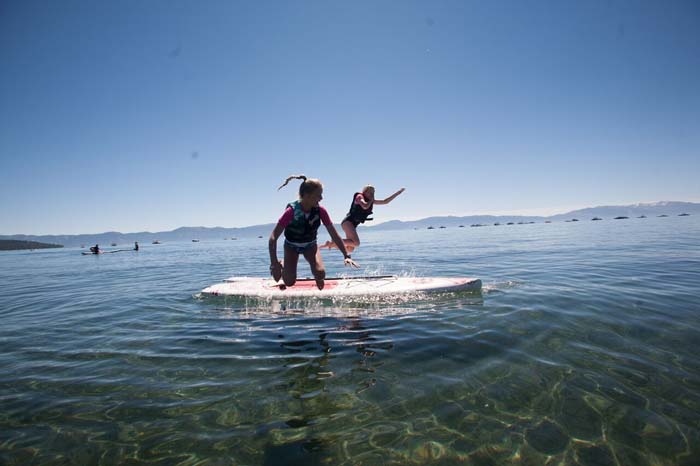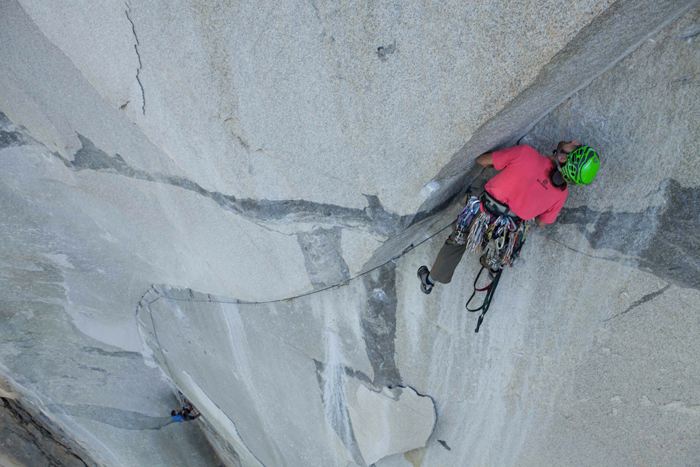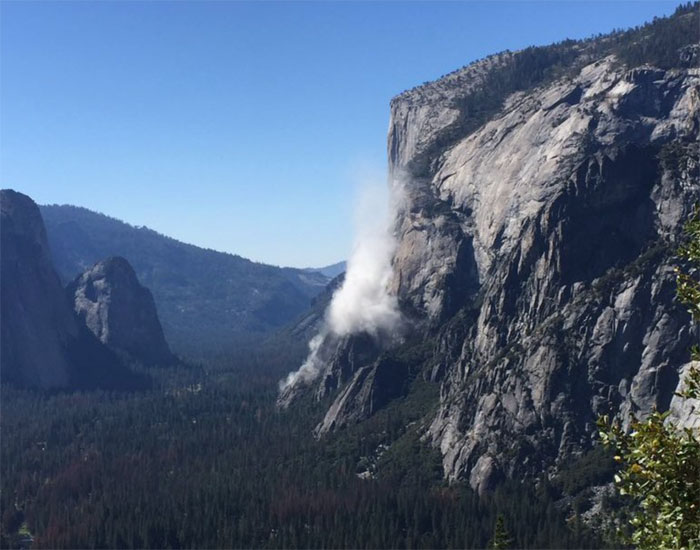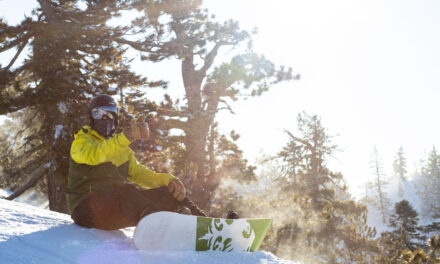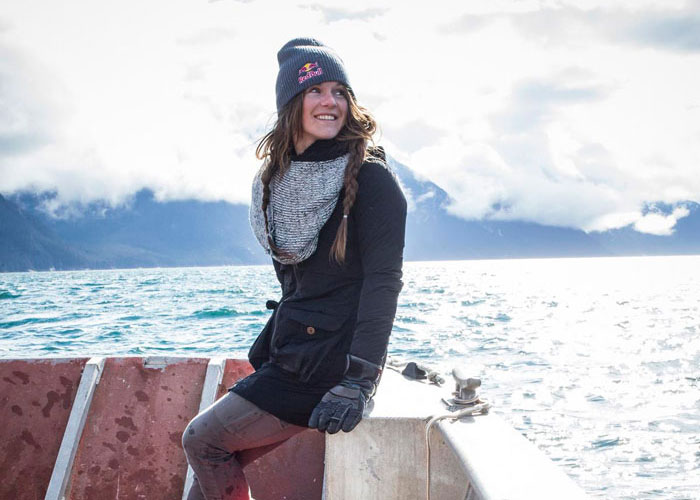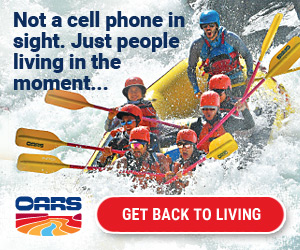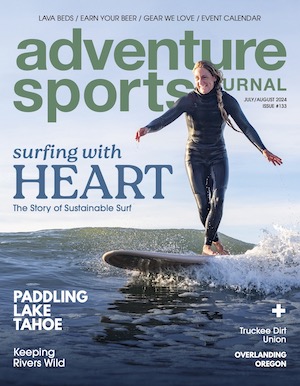- Death Valley’s Battle With Climate Extremes - 01/01/2024
- The Future of Homewood - 12/05/2023
- Kula Cloth - 10/18/2023
Helping kids deal with mental health issues one adventure at a time
By Leonie Sherman
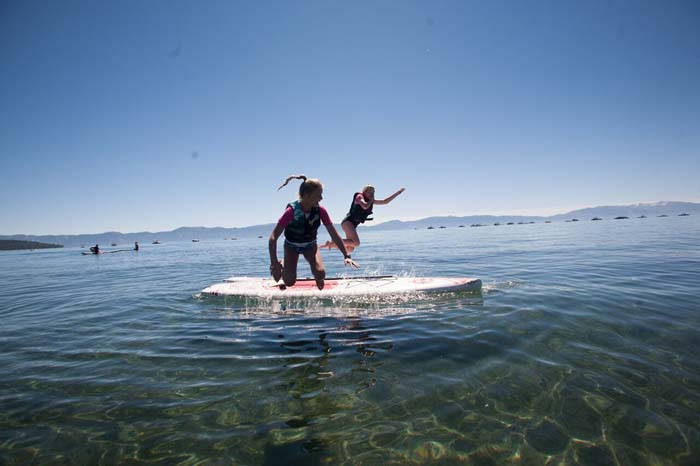
Taking the leap at the Tahoe City SUP event (Daphne Hougard Photography).
LIKE MOST OF US, RENO-BASED CLINICAL AND DEVELOPMENTAL PSYCHOLOGIST Dr. Brie Moore gets her juice from outdoor adventures. “When I’m stressed, or overwhelmed, climbing or snowboarding or paddle boarding clears my head. They give me perspective and allow me to cope with life’s challenges,” she says with a contented sigh. “I realized I wanted to bring those experiences to the kids I was working with.” So she started The Courage Project. In their first summer, the organization sponsored eight different events and reached 50 young people. They’d like to expand into offering snowshoeing, skiing and snowboarding this winter.
The Courage Project aims to enhance the lives of kids struggling with anxiety or depression through a unique climbing, paddling, yoga or hiking experience. Athletes and guides provide quality instruction, while trained Courage Coaches provide individualized evidence-based skills training so that kids can manage their emotions, overcome fear, and access joy. “We help kids take the skills they learned facing challenges paddling or climbing into their daily lives,” says Operations Manager Lauren Allen. “That way when they walk onto campus the first day of school, or make a new friend, they can notice the anxiety that comes up and know they will be able to get through it, and actually have some coping mechanisms for dealing with it.”
“Science tells us that the experience of anxiety in your body is the same regardless of what triggers it,” explains Moore. “So we help kids understand that if they can cope with anxiety on a rock face or paddling on Lake Tahoe, they can do it anywhere. What an inspiring setting to learn those life changing lessons!”
Unlike anxiety, depression is often fueled by what clinical psychologists call the “external locus of control”— basically, is life something that happens to you, or something you can take charge of? “When we teach kids that they are the ones capable of standing up on a board or climbing up a rock face, it instills a sense of agency in their lives,” says Moore. “That helps them feel like they can affect the course their lives take.”
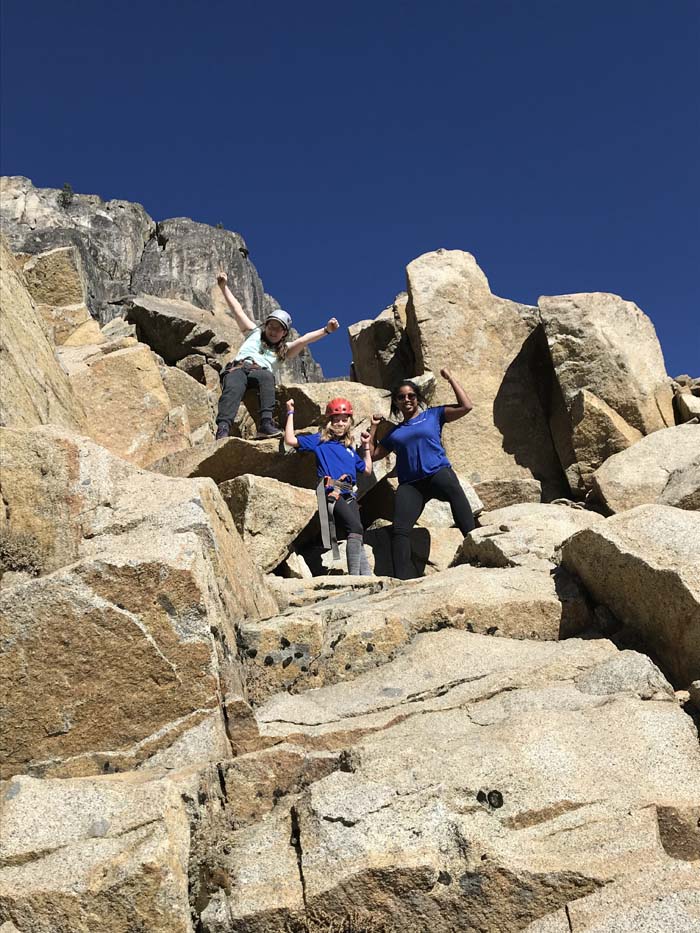
Finding their bold (Kat Fossum).
Moore chose the sports offered through The Courage Project based on her personal and professional experience. “We selected these specific activities because they’re fun and inspiring, but they also require self-reliance. We believe that self-reliance is the birthplace of self-esteem,” she explains. “So our events provide a group-based dynamic and an individual challenge. You can stand up paddle board or rock climb in a group, but eventually you have to get up that rock wall yourself, or stand up on that board on your own. Ultimately kids realize that they are in control of their response to their emotions and thoughts.”
By bringing together young people who are dealing with anxiety and depression, The Courage Project shows them they aren’t alone. A recent study found almost a third of adolescents experience anxiety on a regular basis but up to 80% of young people with diagnosable conditions aren’t getting any kind of treatment. “A big part of our mission at The Courage Project is to fill this need in a way that doesn’t have all the baggage or stigma attached to going to see a therapist or a psychologist,” says Moore. “We aim to destigmatize depression, anxiety and mental health issues one adventure at a time.”
The adventure component is critical for learning. “Science tells us that kids learn best through play,” explains Moore. “Play is how kids build confidence and work through all of their developmental problems. It’s how they learn about themselves and the world, how to be self-reliant. And it’s also about having fun and experiencing joy! Our events are spontaneous and fluid, unexpected things arise and you have to choose how you want to respond to them — just like life!”
Though they focus on young people with mental health concerns, they believe the tools they offer are useful for anybody. “This is not a program for only people who have been diagnosed with issues, this is a program for everyone,” insists Allen. “We all deal with anxieties, fear of failure, and difficulty in trying new things.” Without coping strategies or adequate support, a lot of people try to push through on their own or turn to medication. The Courage Project teaches students to embrace those challenging emotions and learn from them. “Through our work we help kids transform their experience with anxiety so it’s not always a negative thing for them,” she explains.
Moore has been amazed at how quickly kids will talk about their fears and feelings. “They are so eager to open up and share. It’s such a gift to them not to have to face these things alone,” explains Moore. “Amazingly, the more space you create for kids to express those feelings of anxiety and depression, the less space those feelings take up.” The Courage Project isn’t just peddling fun; they’re providing meaningful adventures that leave participants with coping skills they can apply to the inevitable challenges of daily life.
High quality mental health care or professional rock-climbing lessons are usually expensive and often out of reach for young people. But the guides, coaches and athlete ambassadors volunteer their time, and equipment is donated, so all the workshops are free for participants. “We provide access to previously inaccessible experiences,” says Moore.
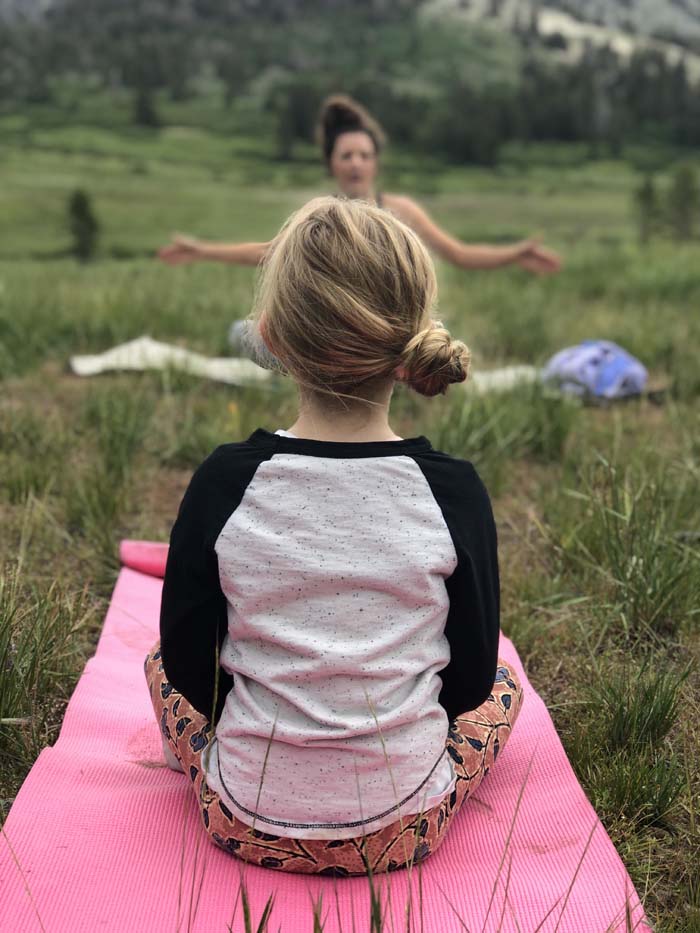
Mountain top yoga with Bridgitte Levy (Lauren Allen).
The Courage Project owes their rapid success to a remarkable partnership with local organizations, athletes and guides. The North American Ski Training Center and Rock Climbing School provides guides and equipment, the elite stand up paddle coaches of Waterman’s Landing lend their expertise, and naturalists from the Tahoe Rim Trail Association and the Tahoe Institute for Natural Science lead mindfulness hikes. “So many people in this area have conquered depression and anxiety through skiing or climbing or paddling and they want to be part of making that possible for young people in the community,” explains Moore. “We are basically showcasing the best of the best that the Tahoe area has to offer in each of these sports.”
Allen says she can see an immediate difference in participants after an event. “I haven’t been able to coach because I’m making sure everyone is safe and accounted for, but I can see the changes that take place,” she says. “These kids leave so much more confident. It’s like they grow three inches in two hours.”
Ultimately, Dr. Moore and her dedicated gang of compassionate coaches and elite athletes aren’t just teaching climbing, paddling or emotional regulation. They’re teaching mindfulness, and the ability to live fully in each moment. “We use natural elements to embody the essence of what we are trying to teach. When we are solid and strong like a mountain, we trust in ourselves and are confident. We recognize we are so much more than our struggles,” explains Moore. ”When water is calm we can see clearly without distortions. Just like the vast expanses of the Sierra or the vistas from a Tahoe beach, we have enough space within us for all of our worry, doubt, fear, pain, sadness and joy. Sometimes we just need to create a little more space.”
Learn more about The Courage Project at courageproject.org.
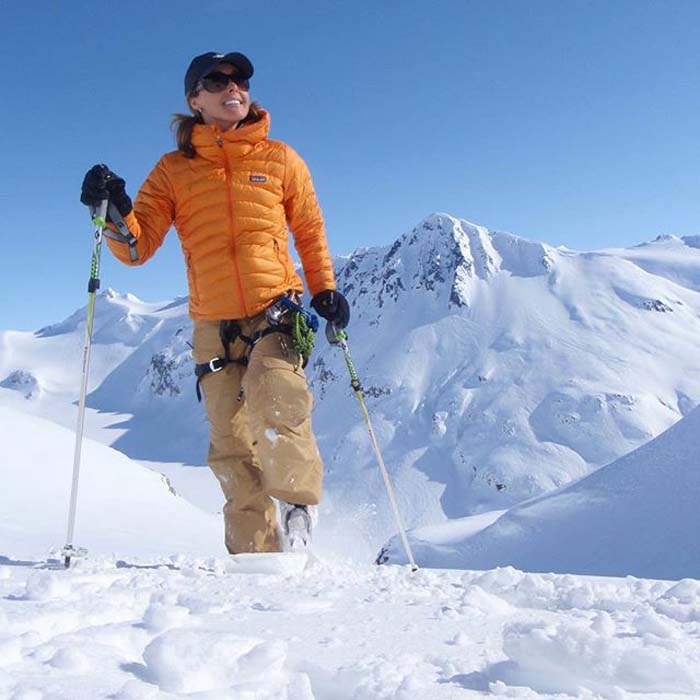
The Courage Project founder, Brie Moore, finding her balance in Alaska’s Chugach range (Jules Hanna Photography).
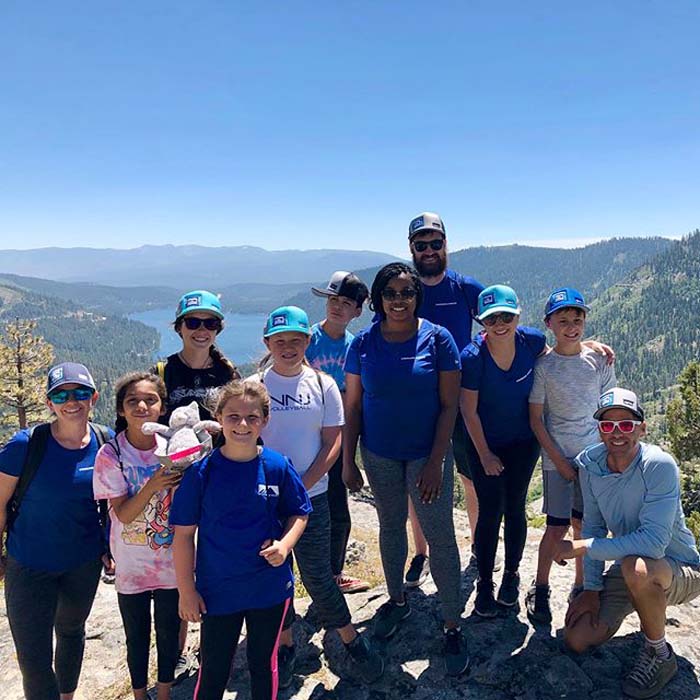
Courage Coaches, kids, and the NASTC crew high above Donner Lake (Lauren Allen).
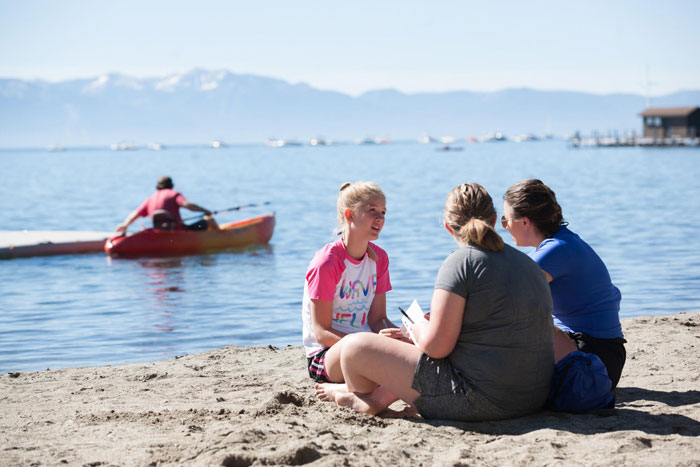
Courage Coaching on the shores of Lake Tahoe (Daphne Hougard Photography).
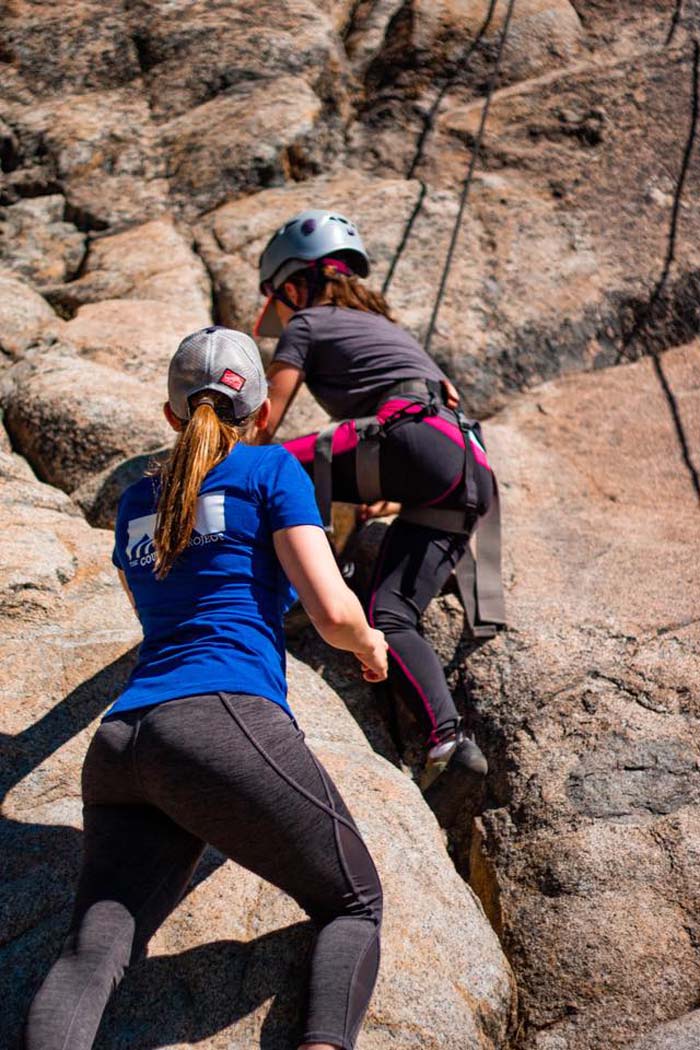
Courage Coaching on Donner Summit (Hannah Skudstad Photography).

